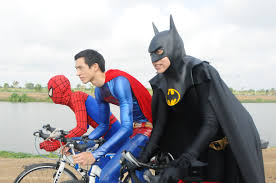Dashrath Manjhi – The Man Who Moved a Mountain - The Mountain Man Bhushan Reddy
Dasrath Manjhi, a landless farmer from India, made history after he spent over two decades chiseling away at a mountain with rudimentary tools, in order to create a road for his community, when the Government refused to.
If you're looking for some motivation, stories don't get much more inspirational than that of Dasrath Manjhi. 53 years ago, he set out to carve a 1mk-long path through a rocky hillside, all by himself, in order to make it easier for his fellow villagers to access schools, markets and neighboring villagers. “This hill had given us trouble and grief for centuries. The people had asked the government many times to make a proper road through the hill, but nobody paid any attention. So I just decided I would do it all by myself,” Manjhi told Indian newspaper Tehelka, in 2007, a shortly before succumbing to the cancer that was plaguing him. With just his chisel, hammer and shovel, this legendary man turned what was once a precarious one-foot-wide passage into a 360 ft-long, 30 ft-wide road accessible by bicycle and motorcycle. The hill kept the region’s villages in isolation, forcing people to trek through dangerous terrain for hours just to reach their lands or the nearest market town. Children had to walk eight kilometers to reach school, but thanks to Dasrath Manjhi’s handmade road, that distance has been reduced to three kilometers, and people from over 60 villages now use it every day.
But what empowered a single man to accomplish such a monumental task? For Dasrath it was the love for his wife. “My wife, Faguni Devi, was seriously injured while crossing the hill to bring me water; I worked then on a farm across the hills. That was the day I decided to carve out a proper road through this hill,” the farmer said. Sadly, his beloved wife didn't get to see the fruits of his labor, as shortly after the accident she fell ill and died, because she couldn’t be taken to the hospital in time. The tragic loss only made the ambitious man more focused on his task, and fellow villagers remember seeing him “ hacking at the hill day and night as if he were possessed”. But with the passing years, his motivation changed. “My love for my wife was the initial spark that ignited in me the desire to carve out a road. But what kept me working without fear or worry all those years was the desire to see thousands of villagers crossing the hill with ease whenever they wanted,” Manjhi said in an interview.
Q:
What do you think about the man who moved a mountain?
Would you sacrifice your life for your lover?
What are the most loving thing you can do to your partner?
What is love?
Why do we like to read or watch love stories?

單車快樂行
Why bike? It makes us happy, researchers say by Liz Murphy
Why do we bike?
As advocates, we’re quick to point out the benefits we can measure: It burns calories, reduces air pollution, relieves traffic congestion and costs less than car ownership. But, for those of us who ride, we know there are even bigger upsides to cycling: Biking makes us feel good. And now there’s data to prove it.
Thanks to researchers at Clemson and the University of Pennsylvania, a study released in 2014 made it official: Folks who bike to their destinations are the happiest. Using the American Time Use Survey, collected by the Bureau of Labor Statistics, Eric Morris and Erick Guerra were able to determine the average mood felt by people during different types of travel — and the demeanor of cyclists was significantly better than car drivers, passengers or public transit riders. Talk about a selling point for cycling.
“Happiness is one of the most ancient subjects researchers have thought about: how do you live the good life?” Morris told us. “With modern data gathering, we can finally get some empirical answers with evidence rather than just speculation. Happiness is very widely studied in economics and psychology, but the study of happiness has come late to the field of transportation, urban planning and cities.”
Morris isn’t a bicyclist himself, and, honestly, didn’t go into the research with any sense that cycling would play significantly into the findings. And while the magnitude of the results — the far more positive moods of bicyclists even when controlling for the physical health of the traveler — was surprising, the notion that bikes give us a mental boost is backed by other research.
“First, exercise really elevates your mood,” Morris said. “But also, I think you’re probably made happier on a bicycle because you feel you're achieving something. It’s been shown that people don’t like tasks that are way too hard for them — but they do like a task that is difficult and they can just accomplish it. From bicycling, you get that sense of mastery and proving to yourself that you’re skilled, rather than just sitting and riding in a bus or a car.”
What does that mean for marketing biking to the masses? While cycling has plenty of perks, this type of research helps advocates make the ultimate pitch.
Q:
Can biking makes us happier?
Where has the beautiful views for cycling?
What are the activities make you feel good?
How often you do exercise?
How do you live the good life?”
How to elevate your mood?
愛妻慘死山難 男花22年愚公移山
2015年08月26日
曼吉的愚公移山感人事蹟已經被翻拍成寶來塢電影。翻攝網路
【動新聞╱綜合報導】印度一名貧困農工曼吉(Dashrath Manjhi),他的的妻子不幸在山谷中遇難,由於地處偏僻,加上山路阻隔,導致他的妻子延誤送醫而送命。為了避免悲劇重演,曼吉花了22年「愚公移山」開鑿山谷通道,大愛精神感動無數人,他的故事近日被拍成寶萊塢電影《山人》(The Mountain Man)。
曼吉的妻子菲谷妮(Falguni)於1959年在當地一處山谷遇上意外,由於地處偏僻,距離最近的小鎮需長途跋涉55公里,當時救護人員未能及時趕到現場,將妻子送往醫院搶救,最終喪命。曼吉不希望悲劇重演,隔年他展開「愚公移山」的浩大工程,單憑錘子與鑿子等工具,日以繼夜工作,最後他在1982年打通山谷與小鎮間的通道,讓原本55公里的距離大幅縮短至15公里。當地政府也在曼吉完工的30年後,將道路鋪平,成為當地居民主要的通道。
故事感動無數人,寶萊塢電影發行商也將曼吉的事蹟翻拍成電影。曼吉於2007年因癌症離世,享年73歲,當時政府認為他的貢獻大,以國葬等級為他舉辦喪禮。


















0 意見:
張貼留言